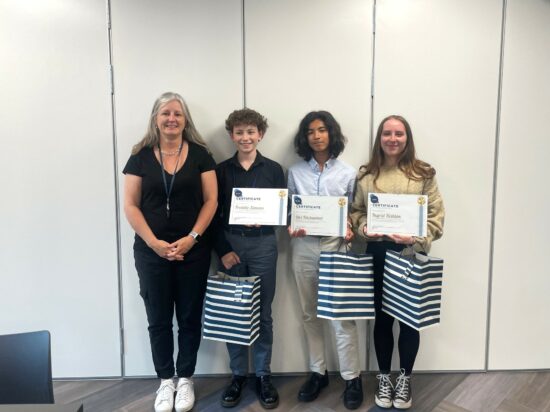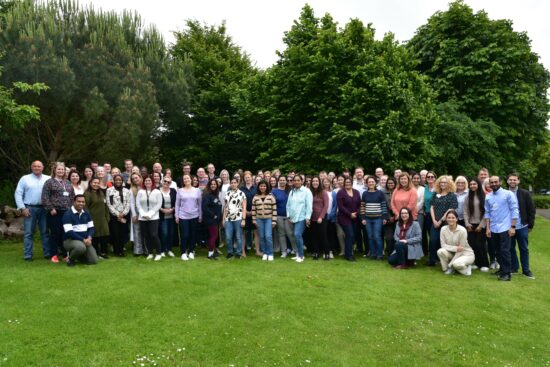FDA’s QMSR Recognising ISO 13485:2016: A New Era for MDR
Published Jul 25, 2024
Published 08th March 2024

Each year, on the 8th of March, we celebrate International Women’s Day to recognise the achievements and successes of women worldwide. This campaign is instrumental in combatting ongoing issues regarding gender inequalities. Upholding diversity and inclusion practices are essential to developing women’s roles within STEM (science, technology, engineering, and mathematics) fields.
The focus of this article will include showcasing the experiences and perspectives of female team members within our regulatory consultancy company. Alongside this, we will explore the role of women in STEM and the growth of women’s roles in shaping the future of technology and innovation.
To honour International Women’s Day and gain real-world perspectives, we engaged in discussions with female leaders within our company, each offering unique insights and experiences in STEM-related roles. Their stories shed light on the challenges, triumphs, and ongoing efforts to foster diversity and inclusion within the pharmaceutical industry.

Dianne Lee, CEO and founder of DLRC, leads the organisation’s strategic operations across the UK, EU, and US. Before DLRC’s inception in 2005, Dianne was an independent contractor for renowned pharmaceutical firms. She served as Director of Regulatory Affairs at Serono UK and contributed to Schering Plough and SK&F. Dianne’s expertise is fortified by her qualifications in Applied Biology, a Diploma in Company Direction (Institute of Directors), and her TOPRA Fellowship. Committed to advancing global healthcare, she champions DLRC’s unwavering dedication to regulatory excellence while fostering positive impacts on people and the planet.
“For me, inclusion means creating a working environment where everyone feels comfortable and is able to raise their hand to discuss potential issues, ask for help, or just have their opinion heard. We should be prepared to make adaptations to facilitate this. This is important in pharma because diversity will bring a broader outlook to the table and will ensure better decisions are made for product development and for meeting the needs of patients.”
“To be honest, I think regulatory affairs is one of those parts of the Pharma industry where women have been able to come into their own. DLRC is very female-dominated at all levels, and a lot of the heads of regulatory departments that we support are led by women. But this is not universally true, so in companies where women are not getting the opportunities they deserve, further work in the Inclusion space will help.”
“Never stop learning. Take every opportunity to understand how to work with people and be open to new concepts. The fact you are female should not negatively influence your decision to go to the next level. And remain true to yourself, don’t try to be something you are not, be self-aware, and don’t apologise for any shortcomings (everyone has them), but make the best of your strengths.”

Sacha joined DLRC Ltd in 2021 with over 20 years of experience in regulatory Affairs. Supporting clients from late phase developments and providing strategic advice, scientific advice, PIPs, and MAAs through to post-approval maintenance. Before joining DLRC, Sacha gained experience with several small pharma companies, working with cross-functional teams and with regulatory consultancies. Sacha has a master’s in clinical research management from Cranfield University and a degree in medical sciences from the University of London.
“I spent my initial studies in clinical training. During this time, I was interested in the science behind disease models and how deeper understandings could drive the development of treatments and sometimes cures. Regulatory Affairs appealed to my inquisitive mind and ability to create practical solutions to scientific problems. Regulatory Affairs offered the opportunity to work with a variety of people as I worked across several functions to bring together the medicine development story, interpret the data and analyse the implications for the patients. I have enjoyed building relationships across the industry to understand the different perspectives and how they meet the common goal of developing future treatments.”
“People thrive when they feel included and recognised. I like to spend time finding out what excites them about their work. Having worked internationally, I value the importance of celebrating different cultural values. It is important for me to create an environment that fosters open discussions, encouraging all the team members to express their views and challenge the status quo. I believe in acting with honesty and integrity, and when something doesn’t seem right, to call it out quickly and work together to find agreeable solutions. I care about people’s development and thrive on seeing team members achieve their goals. Personally, I am driven to achieve and believe my passion and energy can be infectious.”
“I recently took the opportunity to work in Germany for a period of time and embed myself in local office operations. With very limited German, I needed to adapt to a young team and gain a position of trust. I worked with the developing team on complex projects by rolling up my sleeves and getting involved. I built rapport in various ways, from sharing a lunchtime chat to discussing the potential approaches to complex questions. During this period, I was able to offer insights into different approaches whilst nurturing their local initiatives and sharing their value with the wider group. On my return to the UK, I realised the benefit of my presence supported the integration of the team to create a one-company approach.”

Indraj joined DLRC in 2021 and leads the MedTech Consulting team at DLRC. Indraj has over 12 years of experience in Medical Device Regulatory Affairs and Quality Assurance, having worked in industry and consulting roles. She has supported clients during all phases of development, having successfully achieved CE Certification and 510(k) clearance for various devices across a wide range of therapeutic areas. Her expertise lies in strategic support, gap analysis, clinical evaluation, technical documentation creation, procedural support, device submissions and training. Indraj has previously held positions at the MHRA, Stanmore Implants, Biomet, and Emergo. Indraj has a MEng in Medical Engineering from Cardiff University.
“Initially, regulatory affairs within the medical device sector was an unexpected career path for me. My profound interest in technology catalysed my professional development in this field. Engaging in regulatory affairs offers a panoramic perspective of the medical device lifecycle, which enables contributions to various stages of device innovation and development. I believe that gaining experience through work placements at companies with robust R&D initiatives, coupled with a genuine passion for regulatory affairs, is instrumentation for fostering career progression and professional success.”
“Assertiveness and collaboration are both important skills for effective leadership. The key is to balance these two skills depending on the situation. I believe aligning with a shared vision, valuing other’s opinions and expressing gratitude can make my assertive decisions and opinions more acceptable and respectful.”
“I recognise the value of diverse perspectives as they are essential for making effective and innovative decisions. To ensure that diverse perspectives are considered, I endeavour to actively seek opinions and feedback from people with different experiences, expertise and viewpoints. Decisions are also based on data and evidence where available rather than relying on assumptions and bias. I also value open, honest communication and constructive discussion to help me understand my team and their perspective.”

Vesna hails from the former Yugoslavia. Before leaving her homeland, Vesna was a Project Coordinator for a Swedish NGO. Vesna then embarked on a journey to Dar es Salaam, Tanzania, where she dedicated three years to volunteer work with diverse charitable organisations and NGOs. In 2004, Vesna moved to Reykjavik, Iceland, where she established herself as a Regulatory Affairs professional.
Relocating to the UK in 2011, Vesna held positions in prominent pharmaceutical enterprises, attaining a Master of Science degree in 2019. In 2022, Vesna transitioned into regulatory consultancy and recently completed certification as an NLP Practitioner.
“Throughout my career, I’ve been fortunate to have access to a variety of supportive resources that have played a crucial role in my professional development and success. Networking opportunities, mentorship programs, and continuous learning initiatives have been instrumental in expanding my knowledge and skills. Additionally, the support of colleagues, both male and female, who champion diversity and inclusion has been invaluable in fostering a collaborative and empowering work environment.”
“As a woman in a leadership role within the pharmaceutical industry, I have encountered my share of challenges and barriers. However, I’ve navigated these obstacles by drawing upon my courage, determination, and resilience. I’ve learned to approach challenges as opportunities for growth and innovation, leveraging my unique perspective and skills to overcome adversity. Additionally, cultivating strong relationships, building a supportive network, and advocating for myself and other women in the industry have been key strategies in navigating barriers and advancing my career.”
“Women’s inclusion in regulatory affairs is paramount to the company’s success on multiple fronts. First and foremost, diversity in leadership brings a wealth of perspectives, experiences, and insights to the table, fostering creativity, innovation, and problem-solving. In a rapidly evolving industry like pharmaceuticals, where regulatory compliance is critical, having a diverse team of experts ensures that a wide range of considerations and perspectives are taken into account when making strategic decisions and navigating regulatory challenges. Furthermore, promoting gender diversity in regulatory affairs sends a powerful message about the company’s commitment to equality, inclusivity, and excellence, both internally and externally, enhancing its reputation and fostering a positive work culture.”
Through engaging conversations with female leaders in various roles, we can gain insights into their experiences, challenges, and triumphs in navigating the intricate landscape of STEM fields. Their stories highlight the importance of creating inclusive environments and underscore the pivotal role women play in driving innovation and shaping the future of healthcare.
Being a “Woman in STEM” is gaining traction in 2024, but what does it mean?
In the intricate web of progress and challenges, the role of women in the professional landscape is a pivotal thread that demands attention and action. As we navigate the vast expanse of STEM fields, it becomes evident that the journey towards gender equity is multifaceted and intertwined with various factors.
Despite progress in gender equity over the last decade and growing female interest in science, technology, engineering, and math, the landscape of STEM fields reflects another facet of gender disparity. Globally, women constitute only 28% of the STEM workforce. Despite efforts to promote diversity and inclusion, the gender gap in STEM remains pronounced, ranging from country to country, from 14% in India to 24% in the United States.
More work is needed to encourage women to study STEM subjects, transition into the workforce, and become future STEM leaders. But what are the current barriers that need to be overcome?
The gender gap persists in STEM fields due to a multitude of factors that have deep roots in societal perceptions and structural biases. Understanding and addressing these stumbling blocks is crucial for creating a more inclusive and diverse STEM community. Let’s delve into some of the critical challenges faced by women in STEM:
One significant barrier for women in STEM is the enduring stereotype that these fields are primarily for men. There is a prevailing trend in educational aspirations that aligns with traditional gender roles, with boys often gravitating towards STEM professions. At the same time, girls lean towards careers in caregiving and social services. This divergence reflects broader societal expectations and perceptions. This misconception can deter girls and women from pursuing STEM education and careers.
Women remain underrepresented in STEM leadership positions. The scarcity of women in leadership roles within STEM fields makes it challenging for aspiring female scientists, engineers, and innovators to find relatable role models and mentors.
Unconscious biases pervade hiring processes, promotion decisions, and allocation of grant funding in STEM domains. This often disadvantages women and leads to their disproportionately low representation in STEM.
The demanding nature of STEM careers can present unique challenges for women seeking to balance professional aspirations with family responsibilities. Issues such as parental leave policies, flexible work arrangements, and workplace cultures mean women may opt out or choose to work part-time, which can impact career advancement.
Promoting diversity and inclusion initiatives to encourage more women to pursue careers in STEM fields is a challenge rooted in deep-seated societal norms and systemic barriers. These challenges stem from historical gender biases and stereotypes that have perpetuated the notion of STEM as a male-dominated domain. Overcoming these obstacles is complex due to the entrenched nature of these beliefs, which can influence educational choices, career aspirations, and workplace dynamics. Moreover, unconscious biases in hiring and promotion processes present additional hurdles, hindering women’s advancement in STEM fields. To address these issues, the multifaceted nature of these challenges requires comprehensive and sustained interventions.
Promoting diversity and inclusion initiatives is crucial for encouraging more women to pursue careers in STEM fields for several reasons:
Gender diversity and inclusion are fundamental principles of social justice. Encouraging women to pursue STEM careers ensures equal opportunities for all individuals, regardless of gender. It helps break down barriers and challenges gender stereotypes that have historically limited women’s participation in STEM fields.
By promoting diversity, STEM industries can access a broader talent pool. Women comprise roughly half of the global population, so excluding them from STEM careers means missing out on valuable perspectives, skills, and innovative ideas. Encouraging more women to enter STEM fields enriches the talent pool and fosters creativity and innovation.
Many STEM industries face skills shortages; there is a growing demand for STEM professionals globally, and promoting diversity helps address the existing skills gap. Encouraging more women to pursue STEM careers helps address this issue by tapping into an underutilised population segment, ensuring that these industries have access to a more extensive and diverse pool of skilled workers. This is particularly important as technological advancements drive demand for qualified STEM professionals.
Diversity in STEM fields fosters innovation. Different perspectives and experiences lead to more creative problem-solving and the development of better products, services, and technologies. Research has shown that diverse teams are more likely to generate innovative solutions to complex problems because they can draw from various perspectives and experiences. By ensuring women are included in STEM careers, societies can drive economic growth and remain competitive in a rapidly evolving global market.
Promoting diversity and inclusion initiatives in STEM provides role models for future generations of women. Seeing successful women in STEM fields can inspire young girls to pursue similar career paths. Additionally, mentorship programs can guide and support women entering STEM fields, helping them navigate potential challenges and advance in their careers.
Diversity and inclusion initiatives focus on increasing the number of women in STEM and creating inclusive work environments where all employees feel valued and respected. By fostering a culture of inclusivity, STEM industries can attract and retain talented individuals from diverse backgrounds, leading to higher job satisfaction and productivity. Inclusive teams also tend to make better decisions. When considering different perspectives, teams are more likely to identify potential risks, opportunities, and alternative solutions. This can lead to more robust and effective decision-making processes within STEM industries.
In many STEM industries, the end-users of products and services are diverse. Having diverse teams ensures that these industries can better understand and cater to the needs and preferences of their diverse consumer base.
Promoting diversity and inclusion initiatives is not just about business benefits but also social responsibility. It sends a message that the company values diversity and is committed to creating equal opportunities for all individuals, regardless of gender, race, or background.
Inclusive workplaces where diversity is valued tend to have higher employee satisfaction and retention levels. Employees who feel valued and respected for their unique contributions are likelier to be engaged and committed to their work.
As the value of women’s involvement in STEM is becoming more apparent, broader incentives for increasing its growth are on the horizon. STEM Women is an example of an organisation that builds support communities for graduates looking to enter the STEM workforce. In addition, Scholarship programmes have been introduced by the British Council. They apply to women who have obtained a bachelor’s degree in a STEM subject and are interested in advancing towards a master’s qualification.
Promoting diversity and inclusion initiatives in STEM is essential for creating a more equitable and innovative society. By encouraging more women to pursue STEM careers and creating inclusive work environments, societies can unlock the full potential of their talent pool and drive positive change in the STEM fields. It is not only the right thing to do from a social and ethical standpoint, but it also brings significant benefits to STEM industries regarding innovation, problem-solving, talent acquisition, and employee satisfaction.
DLRC is committed to fostering gender diversity and supporting women team members through various initiatives and support systems. Here’s a glimpse into the measures we’ve implemented to promote inclusivity and empower women in our organisation:
We pride ourselves on our commitment to gender diversity across all levels of the organisation. Our board comprises 44% female members in the UK, while senior leadership positions boast a 67% female representation. Furthermore, 75% of our team leaders are women. Across the entire UK company, 73% of our workforce is female. Similarly, within the DLRC Group, we maintain high levels of gender diversity, with 44% female directors, 60% female senior leaders, and 75% female team leaders, contributing to an overall company-wide representation of 73% females.

We actively support female-focused charities to contribute to causes that uplift and empower women. In March, we are fundraising for the Linda Norgrove Foundation, which is dedicated to assisting women and children in Afghanistan. The foundation focuses on developing and supporting programs with a particular emphasis on education and income generation for women, aligning with our commitment to supporting women’s empowerment globally.
We prioritise women’s health by organising informative sessions on topics such as cervical cancer and endometriosis. In November, we hosted Endometriosis UK for a health talk, covering various aspects, from symptoms to diagnosis and pain management. This session facilitated discussions on how organisations can better support individuals with endometriosis. With our company’s flexible working approach, we aim to provide a supportive environment for colleagues dealing with health challenges like endometriosis.
DLRC understands the importance of engaging with the broader community and contributing to STEM career events. In February 2024, DLRC team members attended the Access to All STEM Career Challenge event at Hertfordshire Development Centre in Stevenage for 55 young people. The Access to All programme is funded and supported by Mission 44, the event aimed to promote careers within STEM to young people from underserved communities.
Celebrating women in STEM is not just a one-day affair but a continuous commitment to fostering a more equitable and inclusive future for all. The narrative of women in business and STEM is not confined to statistics; it’s a narrative of empowerment, resilience, and potential. As we unravel the broader picture, we must address systemic barriers, challenge stereotypes, and foster inclusive environments. So everyone, regardless of gender, can thrive and contribute meaningfully. By breaking barriers and empowering women, we pave the way for a more equitable and prosperous future for all.

Published Jul 25, 2024

Published Jul 24, 2024

Published Jul 23, 2024

Published Jul 19, 2024

Published Jul 18, 2024

Published Jul 01, 2024

Published Jul 01, 2024

Published Jun 27, 2024

Published Jun 26, 2024